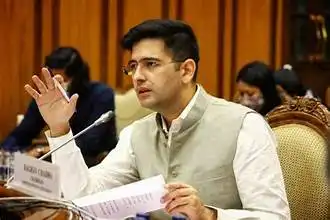In a significant legal development, the Supreme Court of India has taken a crucial step by admitting a petition submitted by AAP MP Raghav Chadha. This petition challenges the suspension of Mr. Chadha from the Rajya Sabha, one of India’s prestigious legislative bodies, on the grounds of allegedly forging signatures of fellow Members of Parliament (MPs). The forged signatures were used to propose their names as members of a parliamentary panel without their consent.
The Supreme Court’s decision to admit this petition has raised several pertinent questions and legal intricacies. It is essential to delve into the details of this case to understand the implications and the ongoing legal proceedings surrounding it.
The Allegations and Suspension:
Mr. Raghav Chadha found himself suspended from the Rajya Sabha in August, following allegations made by four fellow MPs. These allegations claimed that Mr. Chadha had proposed their names for membership in a house panel without their consent. The house panel, in question, was tasked with examining the Government of National Capital Territory of Delhi (Amendment) Bill, 2023. This bill aimed to grant the central government more authority in the administration of the national capital.
The Complaints and Referral:
The allegations against Mr. Chadha prompted swift action within the Rajya Sabha. Chairman Jagdeep Dhankhar received complaints from MPs belonging to various political parties, including Biju Janata Dal, BJP, AIADMK, and others. These complaints alleged that their names had been proposed for the panel without their prior approval. In response, the matter was promptly referred to the privileges committee of the House.
The privileges committee’s role is to investigate breaches of parliamentary privileges and recommend appropriate actions. In this case, the committee’s inquiry would prove crucial in determining the validity of the allegations and whether Mr. Chadha’s actions warranted suspension.
Resolution and Suspension:
Subsequently, the Rajya Sabha passed a resolution, spearheaded by Piyush Goyal, the Leader of the House. This resolution called for the suspension of Raghav Chadha until the privileges committee could present its findings on the matter. The suspension was predicated on allegations of unethical conduct and a disregard for the established rules of the legislative body.
Raghav Chadha’s Defense:
In response to these allegations, Mr. Raghav Chadha vehemently defended himself. He asserted that the accusations against him were baseless and politically motivated. Mr. Chadha went on to challenge the BJP leaders to provide any concrete evidence of signature forgery on his part. He argued that the BJP was targeting him due to his youth and the fact that he dared to challenge some of the party’s most prominent figures.
The Misinformation Campaign:
During his defense, Mr. Chadha also highlighted what he referred to as the BJP’s strategy of “repeating a lie a thousand times until it becomes the truth.” He accused the party of launching a misinformation campaign against him, which he found necessary to address to clear his name.
The Signature Forgery Debate:
Mr. Chadha pointed out a crucial aspect of the case, emphasizing that the panel nominations were made without any signatures involved. This, he argued, made the concept of forgery irrelevant, as no signatures could be forged when none were used in the process. His statement raised a significant question about the legitimacy of the suspension.
The admission of Mr. Raghav Chadha’s petition by the Supreme Court marks the beginning of a significant legal battle. The case not only sheds light on the complexities of parliamentary procedures but also highlights the intersection of politics and law in India. As the legal proceedings unfold, it remains to be seen how this high-profile case will impact the political landscape and the principles of parliamentary conduct in the country.









